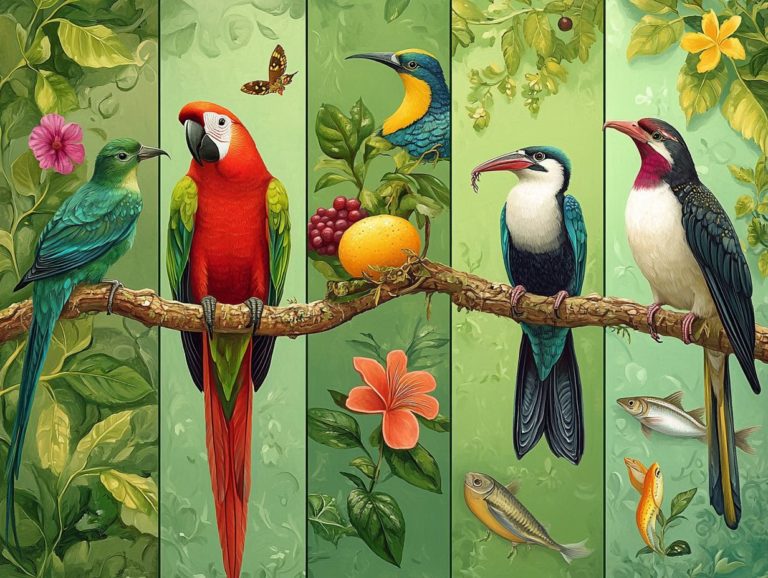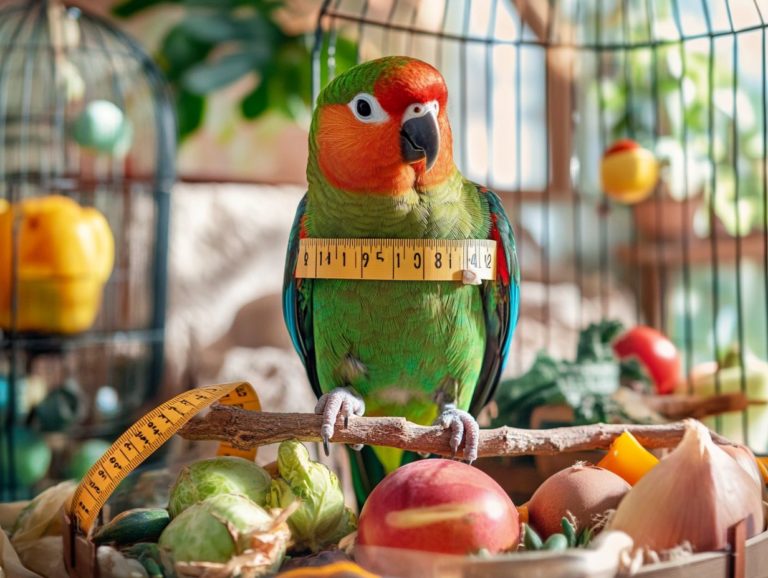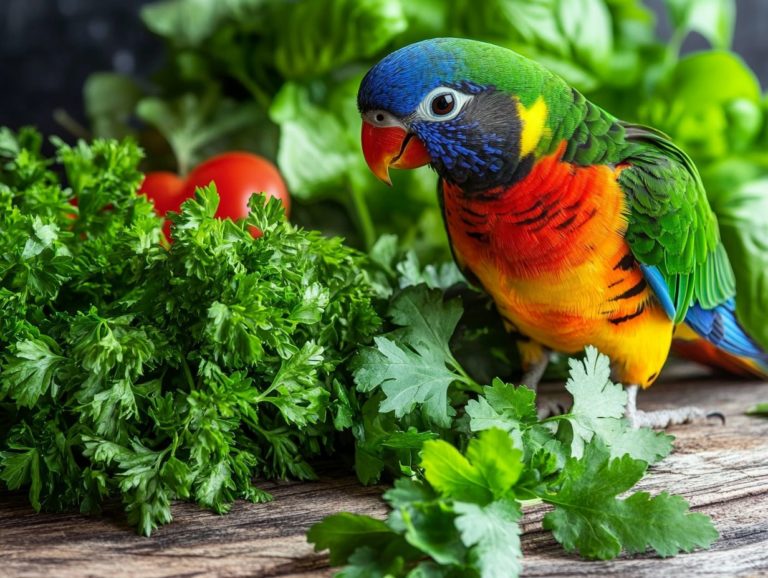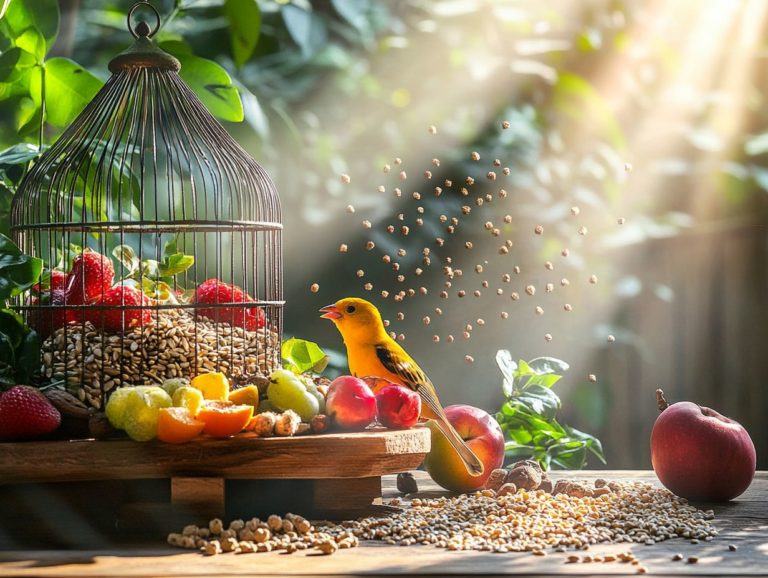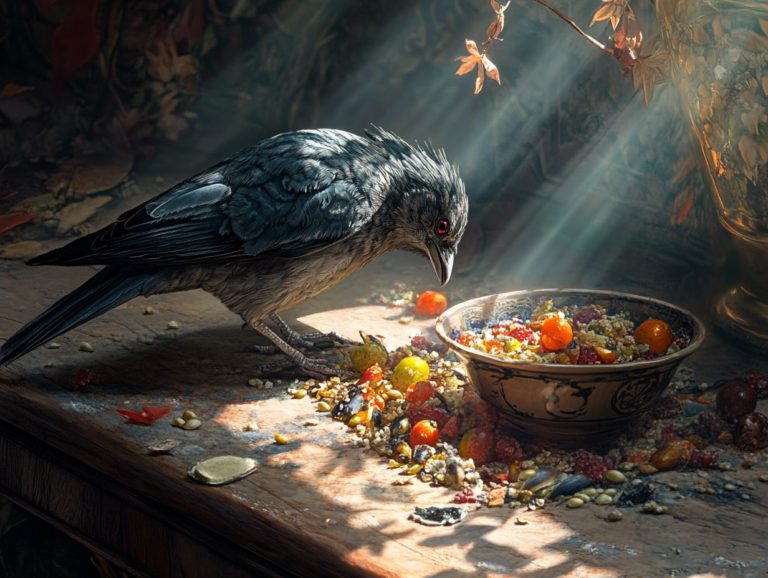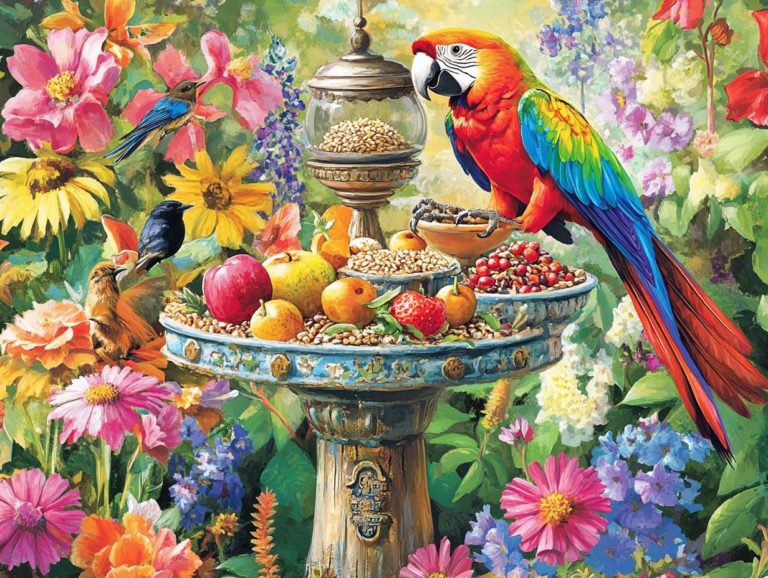Balanced Diet for Pet Birds: Essentials You Should Know
A balanced diet is essential for the health and well-being of your pet bird, just as it is for any other cherished companion.
Understanding vital nutrients such as proteins, carbohydrates, and vitamins empowers you to make informed decisions about your bird’s diet. This article delves into the best foods for your feathered friends, highlights common nutritional deficiencies, and offers valuable tips for crafting a balanced diet plan.
It also addresses when and how to incorporate dietary supplementation to ensure your pet bird thrives. Explore the insights within to discover how you can keep your avian companion healthy and happy!
Contents
Key Takeaways:
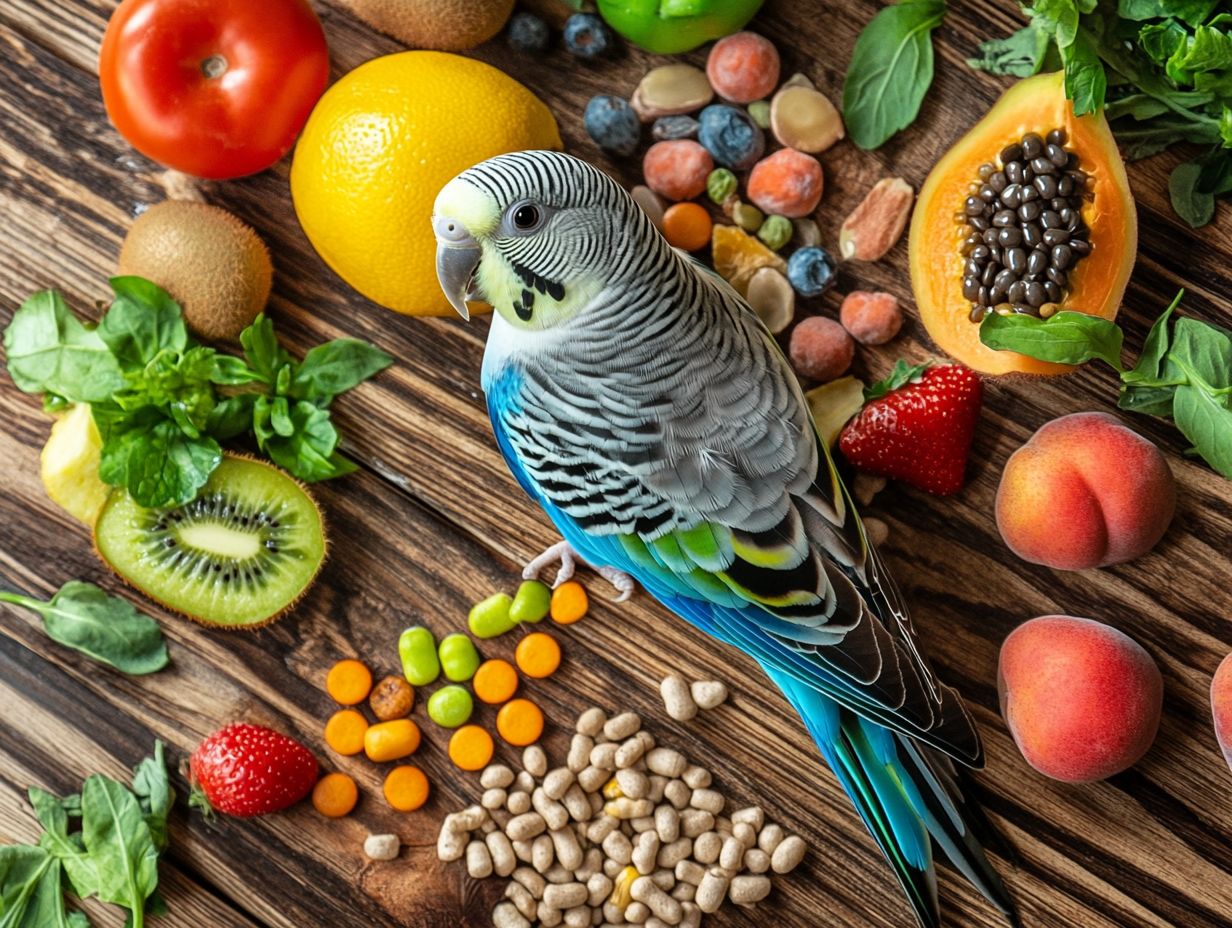
- A balanced diet is crucial for the overall health and well-being of your pet bird.
- It should include essential nutrients such as protein, carbohydrates, fats, vitamins, and minerals.
- Symptoms and consequences of common nutritional deficiencies can be prevented by providing a balanced diet and proper supplementation.
Why a Balanced Diet is Important
A balanced diet is essential for your pet bird as it directly influences their overall health and well-being, ultimately affecting their longevity and immunity. For detailed information, check out what pet birds eat. Just like you, birds require a diverse array of nutrients to thrive—proteins, carbohydrates, healthy fats, vitamins, and minerals.
Neglecting to provide a nutritionally rich diet can lead to a host of health issues, behavioral problems, and a weakened immune system. Understanding your bird’s dietary needs is therefore paramount.
Bird nutrition goes beyond merely preventing deficiencies; it plays a crucial role in promoting vibrant plumage, optimal energy levels, and healthy organ function. To achieve this, you should consider how to create a bird-friendly diet plan that includes a mix of high-quality pellets, fresh vegetables, grains, and occasional fruits to ensure a well-rounded intake.
An imbalanced diet can lead to serious conditions like obesity, liver disease, and feather plucking, which can drastically impact your bird s behavior and social interactions.
Giving your bird a balanced diet is a fun way to boost their happiness and health! Prioritizing their nutritional needs not only enhances their health but also enriches the bond you share.
Essential Nutrients for Pet Birds
To ensure your pet bird thrives, it’s essential to provide a diet that’s rich in a variety of nutrients, including vital proteins, carbohydrates, fats, vitamins, and minerals. For more guidance on feeding your feathered friend, check out what to include in your bird’s diet. Each of these nutrients plays a critical role in supporting your bird’s health, fostering growth, aiding reproduction, and bolstering a robust immune system.
By understanding these essential nutrients, you can make informed choices about the right bird food that meets your pet’s specific dietary needs, ensuring balanced nutrition for parrots.
Protein, Carbohydrates, Fats, Vitamins, and Minerals
In the avian diet, protein, carbohydrates, fats, vitamins, and minerals play vital roles in ensuring optimal health. You need to provide a balanced intake of these big nutrients and small nutrients to support your birds’ bodily functions, growth, and overall vitality.
For example, nuts can serve as an excellent source of protein, while healthy fats, particularly omega-3 fatty acids (a type of healthy fat that supports brain and feather health), are crucial for their development.
To elevate their diet even further, consider incorporating whole grains such as quinoa and brown rice. These options provide complex carbohydrates that fuel their energy levels throughout the day.
Rich sources of vitamins and minerals are just as essential, with leafy greens delivering the nutrients necessary for healthy digestion and skin integrity. Fruits like berries not only offer antioxidants but also bring a natural sweetness to their meals, which can pique their interest.
By understanding the significance of each nutrient, you can curate a well-rounded menu that greatly enhances your feathered friends’ well-being and longevity, integrating a mix of healthy eating options and treat options.
Don t wait! Start providing a nutritious diet today to give your bird the best chance at a long, happy life.
Best Foods for Pet Birds
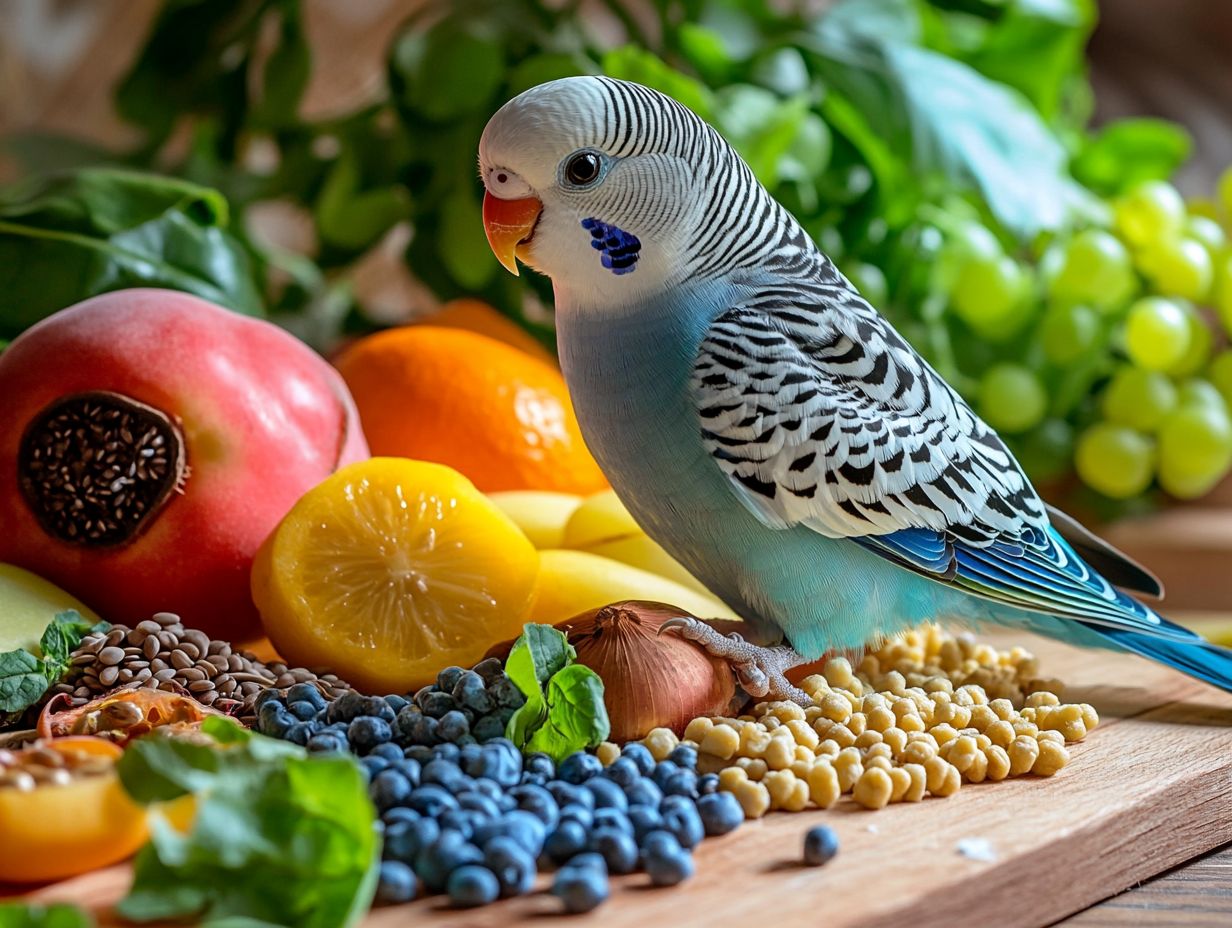
Selecting the finest foods for your pet birds is crucial in fostering a healthy and balanced diet. Your bird s menu should feature a diverse array of bird-friendly foods, including fresh fruits, vegetables, nuts, and top-notch pellets.
A thoughtfully curated bird food selection delivers vital nutrients while ensuring your pet remains engaged and content. By adding vibrant fruits and crisp leafy greens, you can transform mealtime into a delightful and nutritious experience for your feathered companion.
Recommended Foods for a Balanced Diet
A well-balanced diet for your pet birds should include a carefully curated mix of recommended foods that meet their nutritional needs, such as nuts, fresh fruits, and a variety of vegetables. Think almonds, apples, and broccoli; not only do they provide essential nutrients, but they also keep your feathered friends mentally stimulated and engaged. For more insights, consider understanding your bird’s dietary habits.
It’s vital to ensure that the food you choose is high-quality and appropriate for their specific species. Incorporating seeds like sunflower and pumpkin can introduce healthy fats, while leafy greens such as kale and spinach are packed with vitamins A and K.
Pelleted diets formulated for birds deliver a complete nutrition profile, ensuring that all vital dietary aspects are covered. Sprinkling in periodic treats made from carrots and berries can elevate their feeding experience.
Regularly rotating these foods not only prevents boredom but also encourages foraging behavior, allowing your birds to express their natural instincts while promoting their overall health and providing dietary transition to new foods.
Common Nutritional Deficiencies in Pet Birds
Nutritional deficiencies in pet birds can result in a range of health issues, such as feather plucking, lethargy, and compromised immune function. This highlights the importance of a well-rounded diet packed with essential nutrients, particularly vitamin E.
Common deficiencies often involve vitamins like A and E, which are crucial for maintaining skin health and a strong immune system. Identifying and addressing these deficiencies swiftly is essential for securing your pet s long-term well-being.
Symptoms and Consequences
It’s crucial to spot symptoms of nutritional deficiencies in your pet birds. This helps prevent serious health problems. You might notice signs such as lethargy, poor feather quality, and changes in behavior, which often arise from an inadequate intake of essential nutrients.
When vitamins and minerals fall short, your bird s immune system can weaken, making them more vulnerable to infections. For instance, if your bird lacks vitamin A, you may observe respiratory troubles and eye issues, while insufficient calcium can lead to serious complications like bone deformities or metabolic bone disease.
Keep an eye on any changes in your bird’s appetite or weight they’re important clues! Regularly evaluating their diet and making necessary adjustments can play a pivotal role in promoting vibrant health, ensuring your feathered companions thrive and enjoy fulfilling lives.
Creating a Balanced Diet Plan for Your Pet Bird
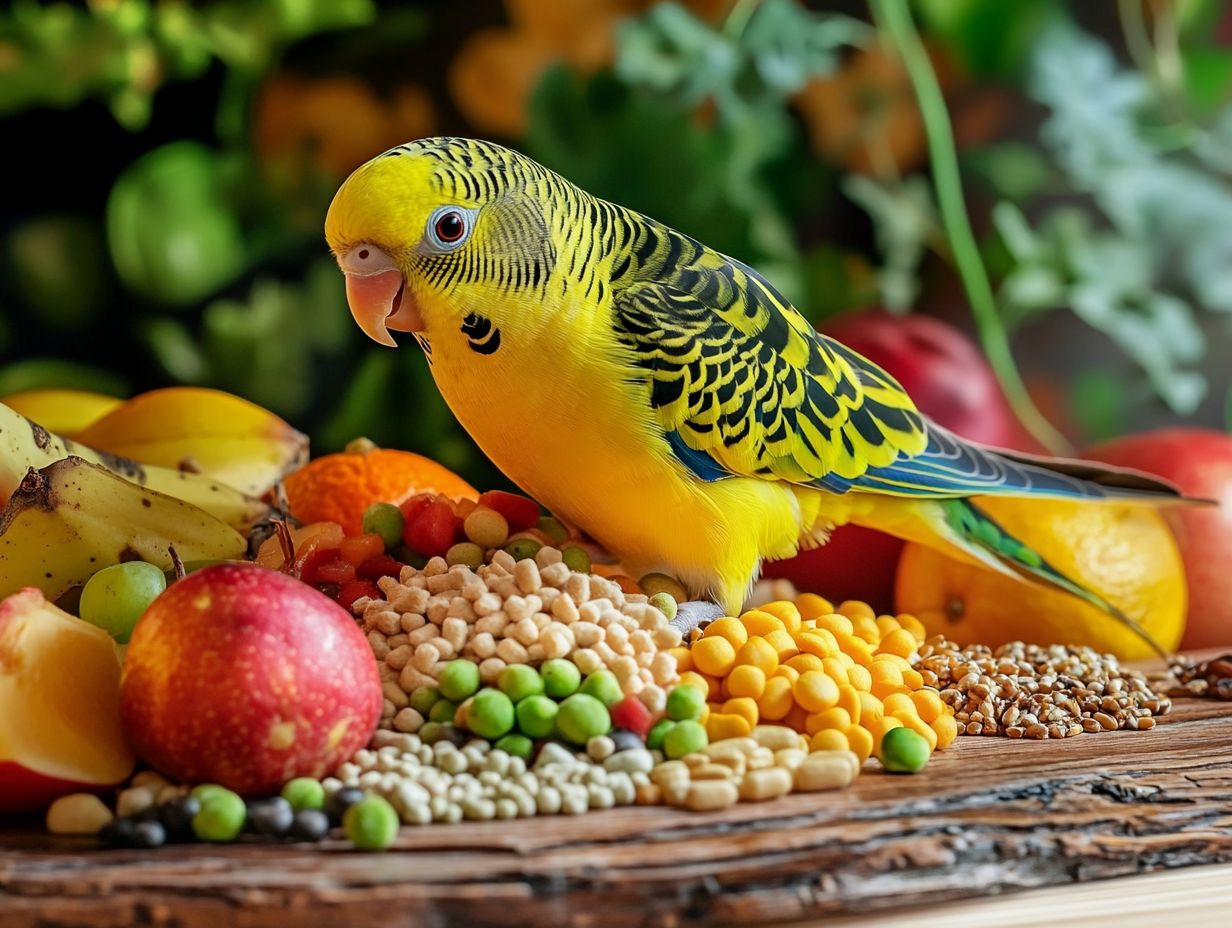
Crafting a balanced diet plan for your pet bird requires a keen understanding of its unique nutritional needs, along with an incorporation of diverse food sources including organic produce. For more details, refer to understanding lovebird nutrition to promote overall health and vitality.
A thoughtfully structured plan should feature fresh fruits, vegetables, nuts, and specialized bird food in pellet form, ensuring the inclusion of high-quality food options while facilitating a gradual transition to prevent any digestive disturbances.
By diligently following feeding guidelines and keeping a close eye on your bird’s health, you can secure optimal nutrition and proactively avert potential health issues, including those caused by seed junkies who may prefer less nutritious options.
Make nutrition a priority for your feathered friend!
Factors to Consider and Sample Diet Plan
When crafting a diet plan for your pet bird, it’s essential to consider several key factors: age, species, health status, and activity level. Each of these elements plays a crucial role in determining your bird’s specific dietary needs.
Younger birds often require a higher protein intake to support their growth. Older birds may benefit from lower-fat options to help manage their weight. The species of your bird is equally important; some thrive on seeds, while others do best with high-fiber pellets as their primary source of nutrition. If your bird has health issues like obesity or feather plucking, tailoring its diet becomes even more necessary.
Incorporating a diverse array of seeds, pellets, and organic foods can provide essential vitamins and minerals, ensuring optimal health. A well-balanced sample diet plan might include:
- Leafy greens like kale and spinach
- Juicy fruits such as apples, berries, and mangoes
- A mix of quality seeds and nuts such as walnuts, pistachios, and sunflower seeds
Keep a close eye on your bird s diet to ensure it stays healthy and happy!
Supplements for Pet Birds
Supplements can be crucial in your pet bird’s diet, particularly when a balanced diet falls short of meeting their nutritional needs or during health challenges. Dietary supplementation can deliver vital vitamins and minerals that may be missing from their main food sources, enhancing your bird’s overall health and well-being.
It’s important to consult with bird doctors to identify the right supplements for your feathered friend.
When and How to Use Supplements
Understanding when and how to incorporate supplements for your pet bird can profoundly enhance its health and nutritional intake, especially during critical life stages or when facing health challenges.
For example, young birds often need an extra boost of calcium and protein to support their growth. Older or ailing birds may benefit from vitamins that boost the immune system. To ensure a seamless integration of these supplements, closely monitor any dietary changes and watch for behavioral or physical shifts. Typically, the best time to introduce supplements coincides with adjustments in diet, environmental stressors, or early signs of illness.
Consulting with bird specialists offers a personalized approach, ensuring you receive tailored recommendations that maximize the benefits of high-quality supplements. This way, your feathered companion can thrive throughout its life.
Frequently Asked Questions
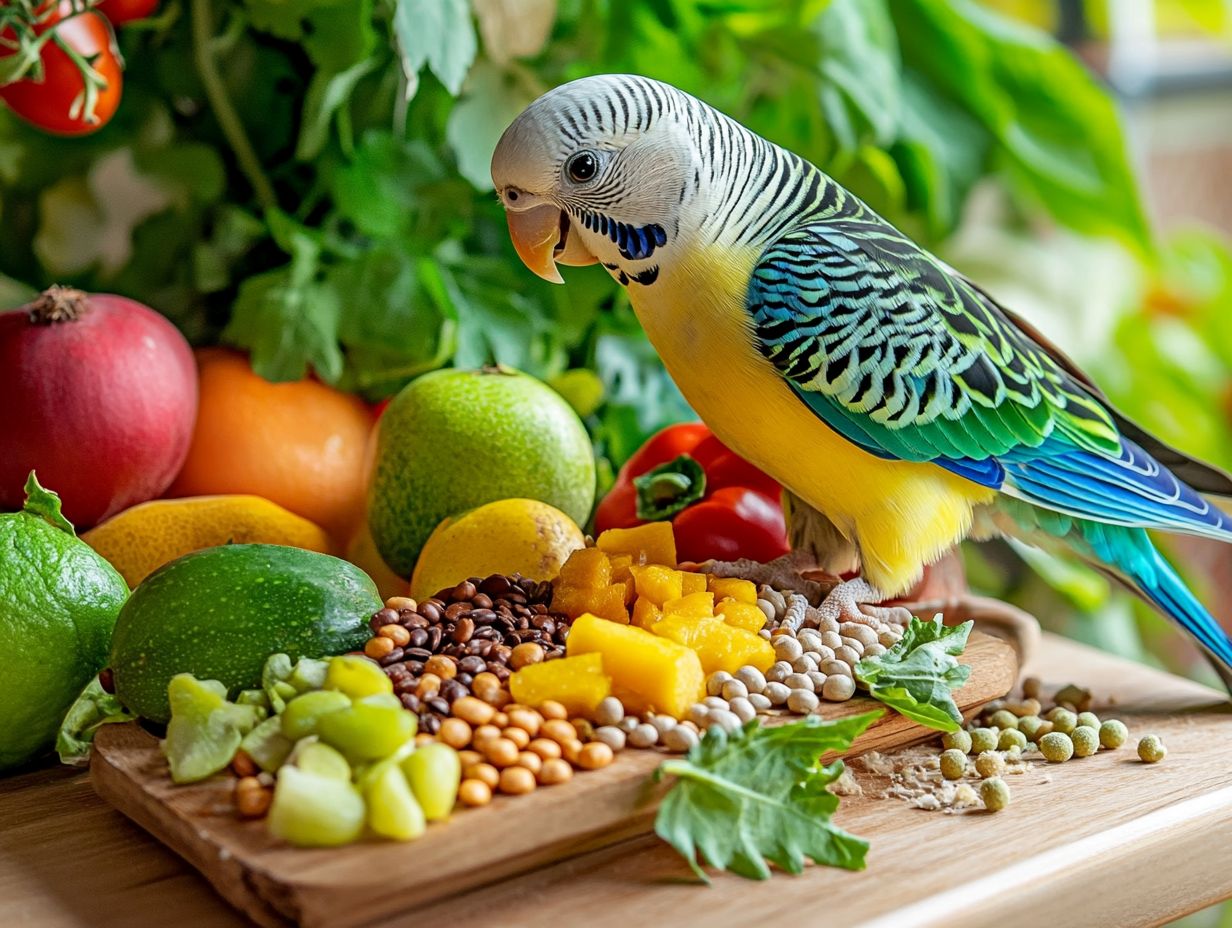
What is a balanced diet for pet birds?
A balanced diet for pet birds is a combination of various types of food that provide all the necessary nutrients for their health and well-being. This includes seeds, pellets, fresh fruits and vegetables, and occasional treats, as well as understanding the benefits of a varied diet for pet birds.
Why is a balanced diet important for pet birds?
A balanced diet is crucial for pet birds to maintain good health, prevent diseases, and promote longevity. For more information on this topic, consider creating a balanced menu for your pet bird, as it also helps to improve their feather quality, energy levels, and overall happiness.
How often should I feed my pet bird?
The frequency of feeding depends on the type of bird and its age. Generally, adult birds should be fed once in the morning and once in the evening. Baby birds may need to be fed more frequently, while larger birds may need only one meal a day.
Can I feed my pet bird human food?
Some human foods can be safe for pet birds, such as fresh fruits and vegetables. However, it is important to research which foods are safe for your specific bird species and to avoid feeding them unhealthy foods like chocolate, avocado, or caffeine.
Do pet birds need supplements?
In most cases, a balanced diet for pet birds should provide all the necessary nutrients. However, if your bird has any deficiencies or health issues, your veterinarian may recommend specific supplements to address common dietary mistakes bird owners make and ensure they get all the essential vitamins and minerals.
Are there any foods that I should avoid giving my pet bird?
Yes, there are certain foods to avoid for your pet bird s health. High-fat or sugary foods are not suitable.
Stay away from foods with artificial preservatives or flavors. Also, some foods are toxic, like onions, garlic, and mushrooms. Make sure to keep these harmful foods away from your feathered friend! Protect their health by choosing the right snacks.

